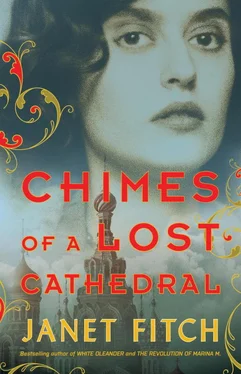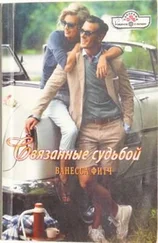“You think I’m not serious?” he said.
“I know you are.” I washed him with a sliver of soap. My heart squeezing itself into a walnut shell.
He came home a few days later with a serigraph of a mother and child. She was tying its shoelaces, and both their cheeks glowed a burnished red. He hung it over our bed. How he loved to look at it when he sat at the table drinking a glass of the samogon his friends brewed down at the machine shop. That picture! I could hardly bear to look at it, that awful poshlost, that treacle. A promise I never made to him. How it rebuked me. Now he wanted to know about my family, my past. I hated to lie to him, just begged him not to ask so many questions. A person had to have something of her own. We talked about his childhood, he talked about our future. What a good mother I would be, how smart my children would be, how handsome. Even minus an arm, he was the luckiest man in the world.
“I’m not that good a bet, Styopa,” I tried to tell him. But I couldn’t tell him why. That I was just biding my time, waiting to have the baby. That I really did care for him but would never love him as a man should be loved. Couldn’t we just go on as it was? It was sweet between us that spring, and I didn’t want to interrupt his delight in everything that had befallen him. He embraced what had been a relationship of convenience with the zeal of the believer. A new sun was rising on a new land, a new breeze blew through the greening trees.
In the evening, when the mosquitoes came out and the frogs chirped like a chorus of creaking doors, we walked up to the ponds to fish. We parked ourselves on boxes under the grieving boughs of the willow trees, and he baited his hook with his rod braced between his feet and knees. While he fished, I watched the reflection of the monastery hanging upside down in the green water. I kept waiting to hear the bells—but nothing ever broke the silence except the occasional splash of water, birdsong, sometimes the whistle of a train—people arriving or departing, their satchels heavy, bulging with foodstuffs, pockets tender with eggs and cheese. Tickets in hand, ready to brave the return to Petrograd with all its inherent dangers—confiscation, arrest.
I envied them. Just the sound of it: return to Petrograd.
What irony. Though I was living with a railroad man, I was the last person in Tikhvin who would ever climb onto a departing train now. Styopa would never help me leave, and he would thrash any of his friends if they so much as thought of helping me. Petrograd! I could taste it, the sea air, the big wide rush of the Neva, the sound of the gulls. Its wide paved streets, its three hundred bridges, I could feel their iron railings warm under my hands. The trees in the Summer Garden would be in leaf now, the statues unboxed. People who had read a book, who could talk about poetry, who cared about art. I craved it like a mineral missing from my diet.
“You should get that divorce,” he said on his box. “Before the baby comes.”
A splash, out on the pond. “Plenty of time,” I said, brushing a mosquito from my forehead. “It’s not due until July.”
He reeled in his line, cast again. “Don’t you want to?”
No, Styopa, I did not want to. I didn’t want to look at that picture for the rest of my life. I didn’t want to talk about the babies we would have together after this one. “It all seems pretty unreal,” I said. “I feel like I’m in a dream. The baby. Everything.”
He smiled. “It’ll be real soon enough, little fox. Soon enough.”
I lay in bed next to him, unearthly light flooding into the room through the uncurtained window. He snored next to me, low and regular. I tried to find a better position. Heartburn was eating me alive. I was sleepy during the day, but when I lay down for the night, no position would give me a second’s respite. The baby had taken my body hostage and now it was in control, pressing up on my heart and lungs, down on my bladder, crowding me physically as my railwayman was crowding me with his hot, solid body, the arm he liked to throw over me as he slept.
What had I done to myself? I could feel the ground eroding from beneath me, like a riverbank collapsing. I had nowhere to run to. I needed Styopa to keep a roof over my head, a place to have this child. I liked him, and that would be enough for most women. I would think of something. If I left him, he’d be all right. There were so many women alone right now, and so few men, one-armed or not, he would have no trouble replacing me. But what of the child? That idea sank away, leaving me with the reality that I had no better option than this. Sooner or later, I would divorce Genya, and become Marina Radulovich, and raise my little son here in Tikhvin. I had to give up on the idea of flight. He would fish with his father, he would catch frogs. Forget the books I wanted to read to him, the things I could teach him about dreaming. He would become a simple provincial boy, no better or worse than any other. It would be the end of the Makarovs and all our culture and pretensions.
And what of me? How many little Raduloviches would I bear before I had enough? Before I forgot who I was and where I came from? Would I end up in the river, a bloated provincial Ophelia?
Styopa threw his arm over me, drew me close to him. I fought him off, it was too hot, and I could hardly breathe as it was. This tenant, crowding me out of the collective apartment of my own body. Kolya’s precious child.
Much as I wanted to murder that man, what I would not give for a half hour with him. We wouldn’t even have to take off our clothes. If only Styopa would stop talking to me! His favorite topics could be listed on ten fingers. One, fishing. Two, ice-fishing. Three, fishing from a boat. Four, the legendary pike he had caught twice but never landed. Five, his sainted mother. Six, the war. Seven, drunken antics with his friends. Eight, the one time he went to Petrograd. Nine, his little brother Toma, who died of scarlet fever. Ten, our family to come. How much better it had been when we had talked only about sex and troop movements.
I got up and used the chamber pot, pulled a chair up to the window and sat with my shawl around me, gazing into the beautiful, weary, light-filled night. In the bed, Styopa stirred, then settled. Even his snoring fell into a pattern. To think that once I’d sworn off rooms. And here I was again. In truth, life was nothing but rooms. I had not been back to the Women’s Club since I’d come to live here, but I was tempted to return, just for the variety of it. This room, this waiting, the growing thing under my ribs, the incessant urination, the endless heartburn.
The sentimental mother and child across the room glowed in the unearthly light, rebuking me. If I ever burned this room down, I’d start with that picture.
June. Heat, green. I could not stay awake. I fell asleep on my feet in the middle of chopping a cucumber, my head drooping at dinner. I couldn’t keep my eyes open. If only I could sleep, and never wake up. At night, I had bad dreams. I dreamed Styopa was rowing me and the baby on the ponds, rowing around in circles with a single oar. I dreamed I had the baby but it was a kitten, and then a doll as big as my hand, a crude doll made of burlap.
I sat staring out the window one day, when I noticed people hurrying down the street, running toward the station. No one ever ran in this town. Had there been an explosion? A fire? Not just barefoot boys but kerchiefed women, and children, men in caps and leather aprons from the foundry. I rose heavily and thudded down the splintery stairs, out onto the road, dirt under my bare feet. “What’s going on?” I shouted.
“Lenin!” a man shouted.
Читать дальше












